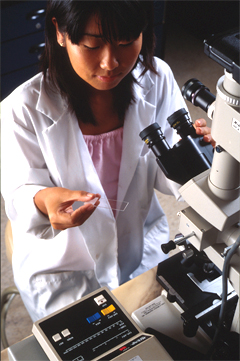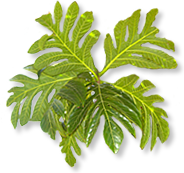The Tropical Agriculture and the Environment (TAE) undergraduate program at the University of Hawaii at Mānoa (UHM) is a unique program for those who like the outdoors and wish to combine that interest with a professional career. Our students come from many academic and cultural backgrounds. Some have very little practical environmental or agricultural experience. However, they all share a keen interest in applying science for the purpose of finding practical solutions to problems. The comprehensive undergraduate program gives students the opportunity to study plant systems at the molecular, biochemical, or species level, as well as managed and natural ecosystems. Our graduates have a wide variety of career opportunities from which to choose, ranging from the laboratory to outdoor activities.
 Biotechnology is one of the exciting new fields offered in the program. Several members of the TAE faculty are responsible for genetically engineering a ring spot virus resistant papaya cultivar, which has saved the local industry. This technology, in conjunction with traditional plant breeding and production related research, has the potential is to increase food supply, improve food quality, and assure food safety while protecting the environment and improving the quality of life. Undergraduates are encouraged to obtain practical experience by conducting research under the direction of a faculty member, and working in a commercial industry via our internship program.
Biotechnology is one of the exciting new fields offered in the program. Several members of the TAE faculty are responsible for genetically engineering a ring spot virus resistant papaya cultivar, which has saved the local industry. This technology, in conjunction with traditional plant breeding and production related research, has the potential is to increase food supply, improve food quality, and assure food safety while protecting the environment and improving the quality of life. Undergraduates are encouraged to obtain practical experience by conducting research under the direction of a faculty member, and working in a commercial industry via our internship program.
Students enrolled in Tropical Agriculture and the Environment program (TAE) will enjoy learning the science, technology, and art of growing and using plants and their products, and about the soils crucial to man. The undergraduate advisors and faculty are committed to preparing you for a challenging career in one of many interesting and rewarding areas.
The University of Hawaii at Mānoa (UHM) is an accredited land-grant university in the tropics, and its program in Tropical Plant and Soil Sciences has a uniquely tropical emphasis. We emphasize the study of the tropical species that are important as Hawaii foliage plants (Mainland “house” plants) such as anthuriums, orchids, tropical lei and cut flowers, nursery and landscape plants, and turfgrass. Other equally important areas of study are the food crops such as vegetables, macadamia nuts, papaya, coffee and new potentially important tropical crops.
Student Learning Outcomes
The undergraduate TAE program is designed to provide the necessary specialized knowledge in the areas of plant and food production and environmental protection via continuous learning and personal growth. Students are also expected to understand Hawaiian culture and history, think critically and creatively, conduct research, communicate and report, show respect for people and cultures and be involved in civic participation.
1. Understand basic plant morphology and be able to use it to identify plants commonly used in the discipline by scientific and common names.
2. Demonstrate fundamental knowledge of biological processes (e.g., life cycles, respiration, photosynthesis, reproduction, source-sink relations, dormancy, photoperiodism, photomorphogenesis) and be able to use this knowledge to interpret horticultural practices and produce quality horticultural crops.
3. Know how to apply appropriate plant management operations, including propagation, pruning & training, plant growth regulators, and environmental manipulations (light, temperature, water, nutrition, soil) in order to produce horticultural crops.
4. Know how to apply IPM strategies (agricultural chemicals or their alternatives and sustainable practices) properly, including scouting & monitoring, timing & scheduling, rotations, calculations, and safety procedures.
5. Understand the basis for genetics and fundamentals of plant breeding.
6. Apply principles of soil science in the management of field soils, displaced soils, and artificial substrates in containers.
7. Use technology effectively, including computer skills and be able to locate relevant data/research in hard copy as well as online.
8. Speak effectively and write concisely on subject matter within the professional curriculum.
9. Realize the need for continuing education in the professional discipline through professional societies, short courses, conferences, use of the internet, and reading.
10. Work effectively in a team situation either as a leader or participant to define problems and identify resources and solutions.
11. Develop a global perspective on horticultural issues.
12. Develop an ethical perspective and sense of moral responsibility and values in making decisions that affect the (human) community and environment.


